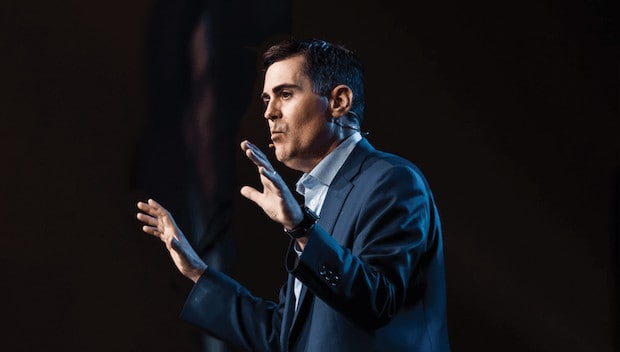By Bronwyn Lea
Russell Moore is a man with big credentials, big responsibility, and a surprisingly big laugh. As president of the Ethics and Religious Liberty Commission (the public engagement arm of the Southern Baptist Convention), Moore is regularly asked to comment on issues spanning pro-life ethics, the Church’s response to racism, all the tricky questions of modern-day sexuality, and the complex relationship between evangelicalism and American politics. Got a hot-button topic you need addressed? Russell Moore is your guy. Yet for all the gravitas of his conversation, he’s no ivory-tower theologian; he’ll just as quickly laugh at a joke or tell an endearing story about his family.

Adopted into God’s family
As one example of “double listening,” Moore offers his own journey of becoming a father of adopted sons and learning what it means to be the adopted son of God the Father. “I had been very reluctant to adopt, even though I considered myself pro-adoption,” he says. “But when we had gone through years of infertility and a series of miscarriages, my wife came to me and said, ‘I feel like God is calling us to adopt,’ and I found myself resisting, thinking we should wait and have our own children first.”
Sometime during the adoption process, Moore recalls God using that experience to change his heart and reshape his convictions. “I started to realize that I had never really understood passages such as Romans 8 and Galatians 3 and 4,” he says. “I had assumed, somehow, that adoption was a second-best kind of reality, which is completely contradictory to how I had come into the family of God by the Spirit of adoption.”
The light of Scripture showed Moore that he “didn’t have a full enough understanding of the fatherhood of God.” It also changed the way he and his wife thought about adoption in their own family of seven (after adopting two boys, they had three more sons). “We learned to use ‘adopted’ only as a past-tense verb, not a present-tense adjective in our home,” he says. Just as one of their sons was born prematurely and they don’t refer to him as their “premature son, Jonah,” so too they avoid referring to their “adopted sons.”
Adoption “doesn’t define them as different sorts of family members,” he says. After all, he points out, this is a lesson to learn from reading life through the lens of Scripture: “We may have been adopted into God’s family, yet he calls us sons and daughters and heirs.”
Joined together in worship
Moore speaks compellingly of how experiences in his church family have driven him deeper into Scripture, too. He recalls a time as a teenager when some women in his church noticed him squirming at the outbursts of a woman with dementia and Tourette’s syndrome during the Sunday worship service.
“She would yell out very inappropriate things,” he recalls, “and I was embarrassed, thinking to myself, ‘What are visitors going to be thinking about our church?’” Seeing his discomfort, several elderly women gently rebuked him. “This is our sister, and we’re not ashamed of our family,” they said. “We serve her and we minister to her.”
“They were exactly right,” Moore says. That experience sent him back to Scripture for some much-needed reframing. “I was thinking of the worship service simply in terms of whether it would welcome or repel new people. But what I didn’t get is the presence of Christ in the worship service. When Jesus says, ‘When two or three of you are gathered together, I am in your midst,’ he means that,” Moore says.
“The book of Hebrews shows us that coming together in worship joins us to an already existing worship service in the heavenly places, so we genuinely are in the presence of Christ and of a myriad of angels and the great cloud of witnesses.” And there it is again: in the same breath, Moore is somehow keeping company with the heavenly host and a woman deeply burdened by mental illness. Life’s questions urge him to dive into Scripture, and Scripture, in turn, propels him to engage with life.
Moore is quick to point out that we need discernment in filtering the assumptions we bring to our reading of Scripture, allowing it to shape not only the answers we seek but the questions themselves. “We learn patterns in our culture—for example, that people are valued for their usefulness and what they’re bringing to the table, and we assume that God is like that as well. One of the constant battles in my life is against a performance mentality with God, and seeing what God’s fatherhood actually is.”
“When God says to Jesus, ‘You are my beloved son, and with you, I am well pleased,’ then because I’m united to Christ through the gospel, that means he says that of me as well. That’s a very difficult thing for me to comprehend, and I have to remind myself of it constantly.”
Practical implications of being part of a family
Moore, author of The Storm-Tossed Family: How the Cross Reshapes the Home, is refreshingly honest about messy, painful realities of Christian life while holding to the beautiful hope in the gospel. His description of family life in his own home and the broader family of God echoes the apostle Paul’s words in Philippians 3: “Not that [we] have already attained it, but [we] strive to take hold of that for which Christ Jesus took hold of [us].” There will be no perfect families on this side of Christ’s return, but still, we are called to lean into the truth that we are God’s beloved, chosen children—and to learn to do family life in individual and church contexts.”
Belonging to a family has immediate, practical implications. In families, we learn that we belong and are loved, and in families, we learn responsibility, service, and how to use our gifts for the benefit of others. In his own family, Moore and his wife, Maria, started giving their children responsibilities from a very young age. Kids who were old enough to toddle around carrying a bucket were old enough to “carry a little pail of compostable material to the compost pile” or “empty wastebaskets in the house when they were a little older,” he says. “Those sorts of things not only teach children how to grow in responsibility but also signal to them, ‘You’re really part of this family. We need you.’”
Similarly, the Moores began teaching their boys to serve their church family in small—but growing—areas of responsibility. “There are all sorts of ways we can implement even very young children in terms of recognizing that they are serving the body of Christ,” he says.
It was just this sort of mentality that drew Moore into ministry. At the age of 12, after mentioning to his pastor that he felt he might be called into ministry, he was tasked with preaching a sermon at a youth-led Sunday service. “Not only did he ask me to do that, but then he showed me how to do it,” Moore says.
“He threw me into the deep end of the pool, but I think it was remarkably wise. He wanted to encourage people to start asking ‘How am I gifted to serve even at a very young age? ’—and to model to the congregation how to cultivate those things.” Moore chuckles at the memory. “He didn’t seem to be worried that the service was not very polished. The music was bad. The preaching was worse. But there was something really glorious in that.”
Shaped by Scripture
Moore’s first sermon may have been terrible, but it began a trajectory for his ministry: seeking to serve God’s Word and God’s people faithfully, even while humbly acknowledging human limits and failings.
And this, of course, is what lies at the heart of his vocation in ethics, which is about seeking to apply God’s unchanging, upright principles to a changing world with complex questions. We won’t always get it right, and we don’t have all the answers, but Moore is confident that whether he’s facing impossible questions from his preschooler or the Church is facing impossible questions about reproductive technology, the Word of God can help us find our footing.
Merely knowing the Bible’s data isn’t enough to help us face the hard questions, he says. “First, we need to form biblical imaginations and be immersed in the biblical story, so that our affections are being formed by the Bible. And secondly, we need people who are discerning about what’s going on around them and trying to anticipate the issues we’re going to be facing.”
This, of course, is what Moore himself is modeling in his own life: learning to love what God loves and want what God wants—and learning this both from Scripture and from paying attention to the questions he encounters in his immediate context. This is what Moore wants for his ministry both at home and in the church. He wants to see the children of God “ready to face whatever temptation comes by recognizing what’s going around them and by having affections that are formed by the Bible.”
***
This article was originally published in the March/April 2020 edition of Bible Study Magazine.
The headings and title of this post are the additions of the editor. The author’s views do not necessarily represent those of Faithlife.







